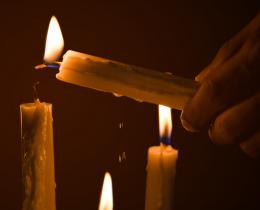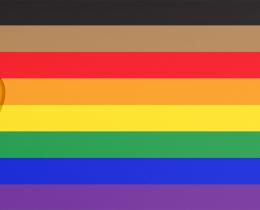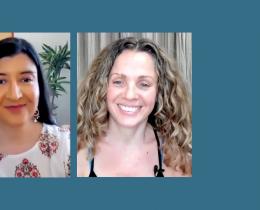Omega: What do you think of the growing popularity and commercialization of feminism in pop culture?
Isabel: It’s fine. Make condoms that say “feminist.” As long as it’s out there. It can take any shape or form or language—just bring it up.
I belong to the generation that lived the feminist revolution. We had a lot of aggression because it was very hard—we were paving the way for our daughters and granddaughters and great granddaughters. In every movement you have to clear the waters eventually. Let it happen. Just bring people in, in whatever way, as long as they are saying it, expressing it, empowering it, and bringing people together.
Why does it have to be dark and somber and gloomy? Make it fun, make it sexy. It’s fire, and it will translate to activism. Of course, at the beginning of the feminist movement, at least in Chile and Latin America, we didn’t know what we were doing. We made a lot of mistakes, and now looking back we wonder how we didn’t think of everything. It doesn’t matter. Go ahead and do it in your own way.
Omega: As an homage to your late daughter's work with young women and girls, your foundation supports organizations that deal with issues of reproductive rights, health care, education, and antiviolence around the world. What have you learned from the foundation's work about what young women and girls are facing today?
Isabel: It’s very different in places around the world. If you are working in a village in India, or if you are working in Germany, it’s completely different. We cannot generalize. But also, times have changed. Today we have the most valuable thing: information. We are connected and informed. It used to take a long time for an idea to germinate. Today it takes days, and that creates a much faster, more inclusive, more global movement.
That doesn’t mean that everyone is automatically included. It means we can reach more people. But there is a long way to go. My granddaughter is completely into the LGBT movement, like most kids today, and I tell her that’s wonderful. And not to forget that there is also a fight you have to fight all your life as a woman, and it’s the fight to end patriarchy. That’s our final goal. We won’t do it separated, but together. So all the aspects of the individual movements are about how we can chip away the power of that one kind of male dominance in any way we can, for everyone.
Omega: Can you describe how you relate political activism and spirituality?
Isabel: I am not a billionaire or a rock star, so my power is very limited. However, we support more than 100 organizations that work with basic needs, and we support the people who are doing that work. What we have noticed, because we work with women, is what I call inclusiveness. The idea of working in circles is prevalent among women, they tend to work across lines, not hierarchically.
Many tribal people also have ways of reaching agreement by including everybody. It’s been obliterated in our society but it’s in the root of us as humans—ways of cooperating and organizing. Women understand it traditionally because they care for the babies, old parents, the weak, and animals. Doing that work creates a feeling that everything is interconnected, that whatever you do has a ripple effect in your group and beyond. You don’t know how far away. That understanding creates a sense of commitment.
I wasn’t looking for a spiritual dimension at all. The Isabel Allende Foundation was practical: I wrote a book and wanted all the income from that book, and future books, to go to an account dedicated to honor my daughter. Because how much money do you need? You can’t wear two hats. The spiritual dimension came from the women in the field. It wasn’t planned, it just happened that all these people have an incredible commitment to life. They are willing to sacrifice themselves and sometimes their families for something that is bigger than them. They forced us to think about what that means. It would have been easier to just write a check. But when you meet them, you can’t deny what you learn.
Omega: You are on the advisory council of the Omega Women's Leadership Center, and your foundation is a financial sponsor. Why is the work we are doing here important to you?
Isabel: Because you bring together young women from different venues and different countries who will be the leaders, and who can change the world. The world is not going to be changed by those who hold power now. The only profound revolutionary change will come from women. Women working with women. Women informed and connected in a new form of leadership. A leadership that is not loud or hierarchical, but inclusive, diverse, compassionate, and takes into consideration the fact that everything is interconnected. You cannot destroy the planet to build a city, or a people to create a nation. Everything is connected.
Omega: We have a hashtag on social media, #DoPowerDifferently. Having witnessed all different ways that people and governments and cultures "do power," what does the phrase Do Power Differently® mean to you? Can you give an example from your own life that demonstrates how you have struggled with using power differently?
Isabel: I think doing power differently is the way women do power. That’s why the mission of my foundation is “empowering women and girls.”
The new form of power is one that understands humanity’s connection—to the planet, to history, to everything—and brings it all together. It’s like a recipe—you pick up all these pieces and make something wonderful with it that couldn’t have existed in separate parts.
There has to be an understanding that you cannot impose things. Sooner or later that breaks apart. You can build, you can create, you can give birth to it, but you cannot impose. I imagine a world—I will not be alive and my granddaughters probably will not be alive—where power between men and women is totally shared, feminine values are just as considered as the male values, and war is not a solution for anything. We all have violence in us. There is violence in nature. That we have to consider, but we don’t need to create more, artificially. Most suffering comes from what we do to other human beings. Very little of it is just destiny or nature.
The real new empowerment is about understanding that and addressing it. It’s a beautiful struggle, and I’m so glad that I will be able to struggle until the last day of my life. What would I do if patriarchy ended before I do? Oh, God. What would I do?



